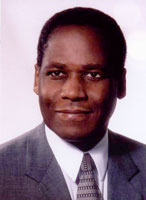
Bethel: Christie government must not “kick the can down the road”, but must act decisively
Letter to the Editor
The Grand Bahama dilemma is primarily a political issue with vast social and economic repercussions for Grand Bahama .
The Hawksbill Creek Agreement ( HCA Act , 1955) create d an area , Freeport /Lucaya, in central GB with defined regulatory powers for economic and social development vested in a private company, the G rand Bahama Port Authority (G BPA ) .
Freeport /Lucaya developed into the second largest city in the Bahamas .
The principal s to this agreement are the GBPA, the Government of the Bahamas (GoB) , and the licensees of the Port Authority.
Herein lay the dilemma: “ a quasi -governmental structure within the borders of a sovereign state, devoid of transparency and accountability in its conduct to the populace.”
The Go vernments of the Bahamas , since 1955 , have historically maintained a “hands off” approach to the affairs of Freeport /Lucaya until circumstances demand intervention usually as a result of public pressure.
The Judiciary has repeatedly affirmed the regulatory powers of the GBPA, thereby restricting meaningful intervention by the central government in the day to day affairs of the Port area .
The GBPA , on the other hand, has taken a laissez-faire approach to performing its regulatory duties in areas such as environmental regulations and public utilities resulting periodically in great distress to businesses and the public residing within Freeport and in neighboring communities, such as Eight Mile Rock.
The outcries over GB Power electricity rates and the Bahama Rock underground blasting are examples.
Foreign direct investments (FDI) and domestic investments continue to be hampered by the cumbersome and conflicting uncertainties surrounding the roles of the GBPA and the central government .
Previous Governments of the Bahamas including the UBP, PLP and FNM have lacked the political will or interest in promoting major changes to the Hawksbill Creek Agreement , preferring instead to tinker at the edges .
Hence the resolution of conflicts amongst the principals to the agreement will require the leadership of the Government of the Bahamas convening negotiations with the parties to address and make recommendations for amendments to the Hawksbill Creek Agreement if deemed necessary.
The outcome of negotiations would result in one of any number of possible scenarios:
1. No Amendments to the Hawksbill Creek Agreement.
2. Amendments to the Agreement that will vest regulatory authority in the central government .
3. Amendments to the Agreement that will vest regulatory authority in a local elected body .
4. Amendments to the Agreement that will vest taxation and budgetary authority in an elected body other than central government .
5. Amendments to the Agreement that will require the GBPA to perform its regulatory duties as define d and agreed positions on those provisions scheduled to fall away in 2015 .
6. Repeal of the Hawksbill Creek Agreement.
The process of wide consultation would ensure that all stakeholders have a voice in the negotiations and outcome .
The economic and social development of East and West G rand Bahama are inextricably tied to economic and social developments in Freeport.
The Christie government’s proposed extension of some provisions of the Hawksbill Creek Agreement to East and West Grand Bahama should follow the proposed review of the Agreement.
The establishment of a Ministry of Grand Bahama is a welcome move designed to bring focus and direction to the specific issues facing GB and should serve as a catalyst to initiate meaningful discourse on the way forward for Freeport, East and West Grand Bahama .
The Christie government must not “kick the can down the road”, but must act decisively and is encouraged not to delay in formulating and initiating a consultative process to address these pressing issues because the future economic and social health of Grand Bahama hangs in the balance .







